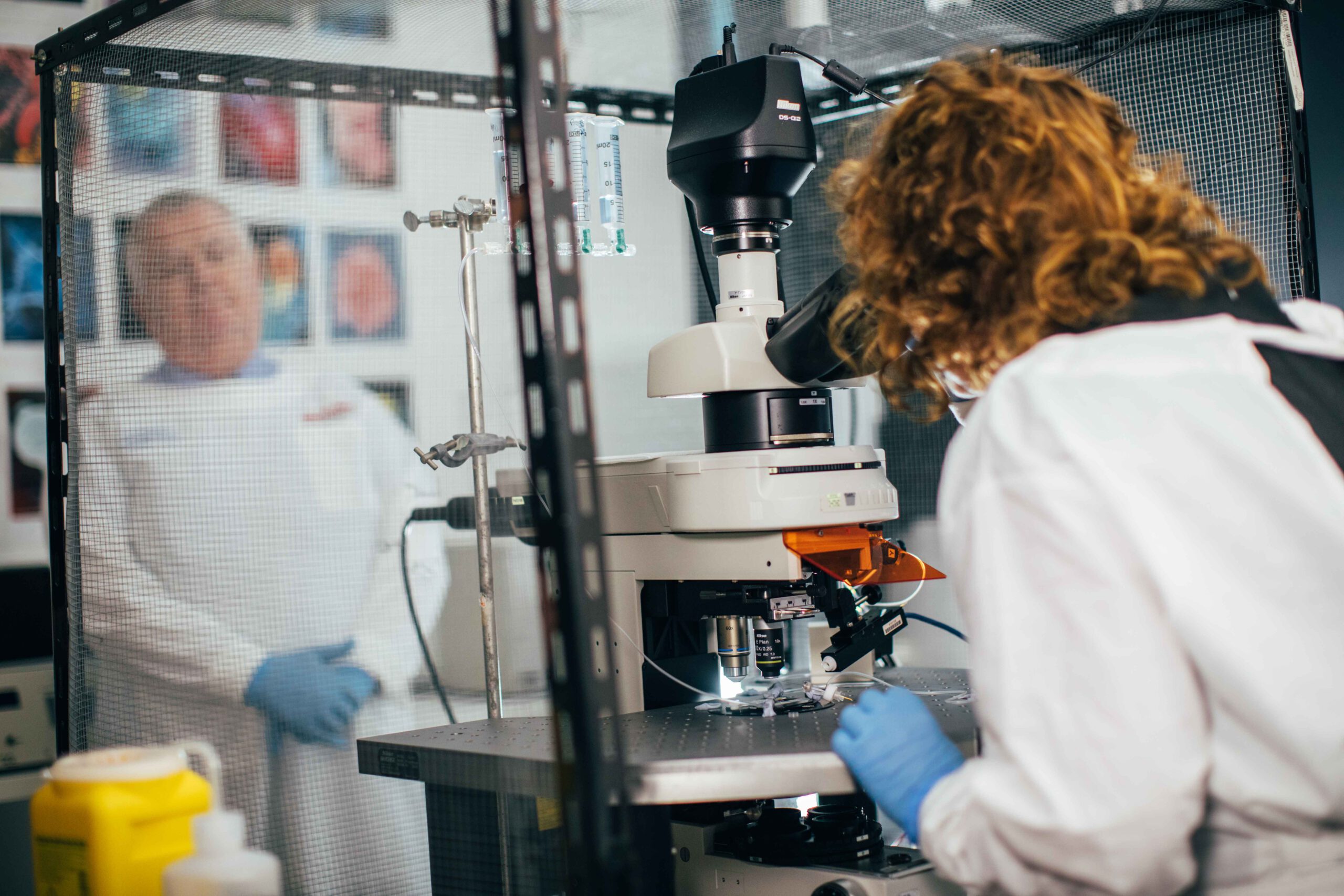
Prof. Sonya Marshall-Gradisnik en Prof. Don Staines. © Griffithy University.
Louise Durack, Griffith University, 27 maart 2018
Meldingen dat een geneesmiddel dat gebruikt wordt om auto-immuunziekten en kanker te behandelen, ook ME/CVS zou kunnen behandelen, zijn weerlegd door een nieuwe studie van de Griffith University.
De studie van het National Centre for Neuroimmunology and Emerging Diseases [Nationaal Centrum voor Neuro-immunologie en Nieuwe Ziekten, NCNED; n.v.d.r.] van Griffith, die in BMC Pharmacology en Toxicology gepubliceerd zal worden, concludeerde dat het gebruik van rituximab bij ME/CVS-patiënten problemen zou kunnen veroorzaken met hun immuuncellen en niet gunstig is als een potentiële behandeling.
De naturalkillercellen (NK-cellen) hebben levensbelangrijke functies om te vechten tegen virussen, bacteriën en tumoren.
“We ontdekten dat deze functies bij ME/CVS-patiënten significant verstoord waren wanneer blootgesteld aan rituximab,” zegt wetenschappelijk codirecteur van NCNED, professor Sonya Marshall-Gradisnik.
CVS – soms bekend als ME (myalgische encefalomyelitis) – is een complexe ziekte die gekenmerkt wordt door aantasting van geheugen en concentratie, metabolische, cardiale, darm- en immuundisfunctie en invaliderende spierpijn en vermoeidheid bij inspanning (ook bekend als neuro-immuunuitputting).
Er wordt geschat dat de prevalentie van ME/CVS wereldwijd tussen 1 en 2 procent ligt. [n.v.d.r. Deze schatting is veel te ruim en is gebaseerd op veel te brede (Reeves-)criteria. Een studie van Palacios et al. toonde een incidentie van CVS van 0.24%, volgens een studie van Nacul gaat het om 0.19% volgens Fukuda-criteria en 0.11% volgens de Canadese criteria].
Gerelateerd aan de ionkanalen
Het team van NCNED aan de Goudkust heeft ontdekt dat de ziekte gerelateerd is aan problemen in de ionkanalen die calcium in de lichaamscellen toelaten. Calcium is nodig in bijna elke cel in het menselijk lichaam en is van vitaal belang om het immuunsysteem te helpen een virus of infectie te vernietigen.
Het team heeft bewezen dat patiënten met ME/CVS lagere calciumgehaltes hebben die tot hun cellen doordringen, dat hun cellen minder calcium opslaan en dat dit de basis is van hun ziekte.
Professor Don Staines, klinisch codirecteur van NCNED, zegt: “Deze resultaten zijn belangrijk aangezien we al weten dat NK-cellen een verminderde functie hebben bij ME/CVS-patiënten, wat suggereert dat bepaalde doses van rituximab mogelijk niet gunstig zijn voor de behandeling van deze aandoening.”
“Het uitvoeren van een eerste studie heeft ons in staat gesteld om aanvullende onderzoeksfinanciering te krijgen van het National Competitive Grants Programme [Australisch financieringsprogramma, n.v.d.r.] van de Mason Foundation, waar we nu een grotere studie kunnen uitvoeren waarbij we dit geneesmiddel in vitro gebruiken om onze nieuwe bevindingen te valideren,” zegt professor Staines.
Eerste auteur van deze wetenschappelijke primeur was PhD-student Mevr. Natalie Eaton. Ze zal de studie presenteren op een door het NCNED gesponsorde conferentie later dit jaar. De focus van de conferentie zal liggen op het bevorderen van het inzicht in pathologie van en farmacotherapeutica voor ME/CVS, via een model van Onderzoek, Innovatie, Ontdekking, Leren en Educatie (RIDLE in het Engels).
 © Griffith University. Vertaling zuiderzon, redactie abby, ME-gids.
© Griffith University. Vertaling zuiderzon, redactie abby, ME-gids.
Rituximab impedes natural killer cell function in Chronic Fatigue Syndrome/Myalgic Encephalomyelitis patients: A pilot in vitro investigation
Natalie Eaton, Hélène Cabanas, Cassandra Balinas, Anne Klein, Donald Staines and Sonya Marshall-Gradisnik
BMC Pharmacology and Toxicology BMC series – open, inclusive and trusted 2018 19:12
https://doi.org/10.1186/s40360-018-0203-8
Received: 8 August 2017 | Accepted: 16 March 2018 | Published: 27 March 2018
Abstract
Background
A recent in vitro pilot investigation reported Rituximab significantly reduced natural killer (NK) cell cytotoxicity in healthy donors. Chronic fatigue syndrome/Myalgic encephalomyelitis (CFS/ME) is a debilitating disorder of unknown etiology. A consistent finding is a significant reduction in NK cell cytotoxicity. Rituximab has been reported having questionable potential therapeutic benefits for the treatment of CFS/ME, however, the potential effects of Rituximab on NK cell cytotoxicity in CFS/ME patients are yet to be determined.
Methods
A total of eight CFS/ME patients (48.63 ± 15.69 years) and nine non-fatigued controls (NFC) (37.56 ± 11.06 years) were included using the Fukuda case definition. Apoptotic function, lytic proteins and degranulation markers were measured on isolated NK cells using flow cytometry following overnight incubation with Rituximab at 10 μg/ml and 100 μg/ml.
Results
There was a significant reduction in NK cell lysis between CFS/ME patients and NFC following incubation with Rituximab at 100 μg/ml at 12.5:1 and 6.25:1 effecter-target (E:T) ratios (p < 0.05). However, there was no significant difference for NFC following incubation with Rituximab at 10 μg/ml and 100 μg/ml.
There was no significant difference between CFS/ME patients and NFC for granzyme A and granzyme B prior to incubation with Rituximab and following overnight incubation with Rituximab at 10 μg/ml. There was a significant decrease in granzyme B in CFS/ME patients compared to NFC with 100 μg/ml of Rituximab prior to K562 cells stimulation (p < 0.05).
There was a significant increase in CD107a (p < 0.05) and CD107b expression (p < 0.01) in NFC after stimulation with K562 cells prior to incubation with Rituximab. There was a significant increase in CD107b expression between CFS/ME patients and NFC prior to incubation with Rituximab and without stimulation of K562 cells (p < 0.01). Importantly, there was a significant increase in CD107b following overnight incubation with 100 μg/ml of Rituximab in NFC prior to K562 cells stimulation (p < 0.01).
Conclusion
This study reports significant decreases in NK cell lysis and a significant increase in NK cell degranulation following Rituximab incubation in vitro in CFS/ME patients, suggesting Rituximab may be toxic for NK cells. Caution should be observed in clinical trials until further investigations in a safe and controlled in vitro setting are completed.
Keywords
Chronic fatigue syndrome Myalgic encephalomyelitis Rituximab Natural killer cells Lytic proteins Degranulation Cytotoxicity
© Eaton et al., 2018
Lees ook van de Griffith University:
- Calciumkanaaldefecten: onderzoek van de Griffith Universiteit uit Australië
- Onderzoekers aan de Goudkust brengen een doorbraak tot stand voor ME/CVS
- Subsidie van 4 miljoen dollar voor de diagnose van ME/CVS
- Ontdekking in de immuuncellen bij CVS zou de sleutel kunnen zijn tot behandeling
- Verdere aanwijzingen in de strijd tegen ME/cvs: afwijkingen in werking NK-cellen
- Griffith Universiteit claimt doorbraak bij diagnostische bloedtest voor ME en/of CVS
- Centrum voor Neuro-immunologie en ME/CVS geopend op de Griffith Universiteit in Australië
- Onderzoeksteam gooit hoge ogen naar het oplossen van het ME/cvs raadsel
Lees ook i.v.m. rituximab
- Noorse studie naar ME/cvs mislukt
- Rituximab-studie fase III – niet in staat om effect te detecteren
- Mella vindt hypometabole staat in ME/cvs plus Rituximab een nieuw geneesmiddel voor ME/cvs?
- Update van de studie naar Rituximab: zoektocht naar genetische markers
- NIH overweegt klinische onderzoeken met Ampligen en Rituximab
- Autoantistoffen gevonden in een subgroep van ME/cvs-patiënten
- Het grootste onderzoek naar een behandeling voor ME/CVS: Fluge en Mella over Rituximab
- Een studie van Fluge en Mella belicht het levensveranderende potentieel van een onderhoudsdosis Rituximab
- Fase II-studie met Cyclofosfamide voor ME van start
- Het Medicijn: Een geschiedenis van Rituximab bij ME/CVS
- Is ME een auto-immuunziekte? Veelbelovende resultaten nieuwste Rituximab-studie
- Kan immunomodulerende behandeling helpen voor ME/CVS-patiënten?
- Na Rituximab studie met kankermedicijn Cyclofosfamide tegen ME
- Fase III Rituximab-onderzoek van start in Noorwegen
- Video: update ME/CVS onderzoek naar Rituximab in Noorwegen (2013)
- Invest in ME en Prof. Edwards (UCL) plannen Britse Rituximab trial
- MEandYou campagne voor grote Rituximab studie (op initiatief van patiënte Dr. Maria Gjerpe)
- Een medicijn voor ME? Het verhaal over Rituximab
- Als Rituximab niet werkt: vervolgstudie met Enbrel
- Kankermedicijn Rituximab geeft tijdelijke afname van symptomen bij ME/CVS-patiënten





